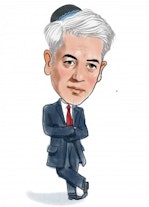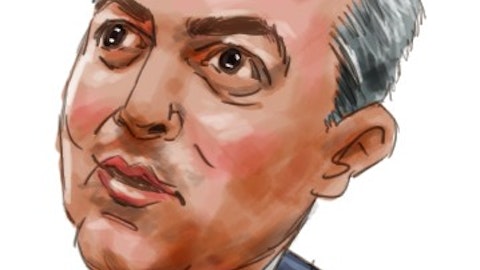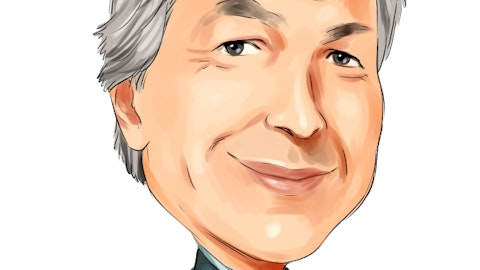Rogers takes on Dr Doom over China (InvestmentWeek)
Veteran investors Jim Rogers and ‘Dr Doom’ Marc Faber have clashed over the merits of investing in Chinese equities. The investors engaged in a heated debate over the long term value case of the Chinese equity market in a head-to-head CNBC interview. Faber argued it is difficult to be bullish on Chinese equities given their poor share price performance over the past couple of years.
Cory Booker lures Wall Street millions to Newark few have seen (NewsDay)
Cory Booker strides to the lectern at a June reception honoring hedge-fund founder Bill Ackman. Pershing Square Foundation, Ackman’s philanthropic organization, had pledged more than $25 million since 2007 to help Booker’s poverty-wracked Newark, New Jersey, improve schooling, enhance parks and find jobs for ex-convicts. Now, in Manhattan’s Mandarin Oriental ballroom, the 43- year-old mayor salutes one of the titans of finance he had persuaded to revive a city in which some have never set foot, Bloomberg Markets magazine reports in its November issue.
The Willis Pension scheme selects Towers Watson for £100m ($161m) hedge fund portfolio (Opalesque)
The Trustees of the £1.5 billion Willis Pension Scheme have chosen Towers Watson to manage a large portion of its hedge fund portfolio on a fiduciary basis, following a competitive tender. The portfolio, which will have an initial value of around £100 million, will be invested in a broad range of hedge fund strategies. Chris Ford, EMEA head of Investment at Towers Watson, said: “This is a significant development for our business and is part of a trend where more clients and prospects are choosing to delegate all or part of their investment decisions to Towers Watson. Our hedge fund capabilities have grown and changed significantly since we started researching hedge funds over a decade ago.”
Hedge funds close third quarter with September gains (HedgeWeek)
Hedge funds posted their strongest monthly performance since February to conclude Q3 2012, led by equity hedge strategies as investor sentiment improved on positive developments in the European banking and sovereign debt crisis, as well as US stimulus efforts, according to data released by HFR. The broad-based HFRI Fund Weighted Composite Index gained 1.1 per cent in September, the fourth consecutive monthly gain, ending 3Q up 2.9 per cent and improving YTD performance to +4.7 per cent. Fund of hedge funds also posted the best performance since February, with the HFRI Fund of Funds Composite Index gaining 0.8 per cent.
Research, timing, and patience are key for AM Capital’s +41.71% Q3 finish (Opalesque)
Vigorous research, buying or selling at opportunistic times and patience are the key drivers for alternative investment manager and Chicago-based hedge fund manager AM Capital Advisors that led the firm to achieve a double-digit +41.71 positive performance during the third quarter of 2012, compared to the DOW Jones Index which ended the same quarter at +9.94%, NASDAQ +17.26%, and S&P 500 index +14.44%. In September, AM Capital’s hedge fund was up + 6.64% versus the DOW index + 2.63%, NASDAQ + 1.72%, and the S&P 500 index at + 2.42%. Since inception as of the end of September 30, 2012 AM Capital’s performance is up 59.88% return over a 39 month period versus over the same period of time the DOW index 59.06%, NASDAQ 68.79%, and the S&P 500 index at 56.45%.
Investors shift focus to relative return, bespoke portfolios (Opalesque)
Frank Frencentese is Global Head of Hedge Fund Investments for Citi Private Bank, which oversees approximately $5bn globally for single investment strategies and customized hedge fund portfolios for ultra high net worth investors. He joined Citi three years ago to build out the firm’s hedge fund advisory service, which includes investment research, product management, and portfolio construction. In a recent Opalesque TV interview, he noted that the lack of hedge fund performance is making some investors – specifically ultra high net worth individuals, more skeptical of increasing their allocations to hedge funds. “There has been a healthy degree of skepticism around hedge funds – a lot of comments – ‘hedge funds, they stole our money, they locked us up, they have not performed in four years, why do I need this in our portfolio?’” As such, much of his work now at Citi, is focused on investor education and advisory services during this low return period.
Funds red light as prime brokerage costs increase (eFinancialNews)
Regulatory developments since 2008 have driven a change in the prime brokerage fund model, to which hedge fund managers and investors must adapt, according to a new report from Barclays. This is likely to result in increased costs for hedge fund clients, says the report, entitled Evolution of the Hedge Fund Financing Model. Jack Inglis, head of European prime services distribution at Barclays, said: “We wanted to shed light on an area that has historically been quite opaque for investors and managers. This was witnessed in 2008 when managers found they lacked clarity on where their assets were held and the sources of liquidity prime brokers were using.”
Activist Investor Sends Ripples to Make Waves (WSJ)
When James Foster, the chief executive of Charles River Laboratories (NYSE:CRL) -1.50% got a call from investor Barry Rosenstein telling him an acquisition he was planning would fail, Mr. Foster says he thought: “Who is this guy?” He soon learned he was facing many CEOs’ worst nightmare: an activist investor in his company’s stock. But instead of getting dragged into a bruising fight, Mr. Foster found himself talking to a soft-spoken yoga devotee who gave as his calling card his ability to establish “collaborative relationships” with executives even while pushing for changes.
Repeal Of Dodd Frank: A ‘What If’ Analysis (SeekingAlpha)
In the most recent presidential debate Mitt Romney further expressed his opinion in regards to the Dodd Frank Act. He claimed that if elected, he intends to revoke the act. Although I do not believe the act will be revoked, it is highly probable that he will make amendments to it if elected. This article outlines the current legislation of the Dodd Frank Act and focuses on what effects the Volcker Rule has on some of the nation’s largest financial institutions. The institutions discussed in this article include: Morgan Stanley (NYSE:MS), JPMorgan & Chase Co. (JPM), Goldman Sachs (GS), Bank of America (BAC), and Wells Fargo & Company (NYSE:WFC).
ETFs without the hefty fees: a no-brainer (MarketWatch)
Hard on the heels of a decision to slash the already-low expense ratio of its own exchange-traded funds (ETFs) , money manager Charles Schwab is out with a detailed survey of its customers that clearly shows why: Investors care about cost. Specifically, they care about getting a very low expense ratio. In its latest ETF Investor Study, Charles Schwab talked online with more than 1,000 individual investors between the ages of 25 and 75 with at least $25,000 in investible assets and some familiarity with ETFs.
Tony Pua calls Dr M senile over Pakatan-Soros remarks (TheMalaysianInsider)
Petaling Jaya Utara MP Tony Pua today called former Prime Minister Tun Dr Mahathir Mohamad senile for saying a vote for the opposition is a vote for currency trader George Soros. The DAP MP pointed out that it was the former prime minister who had previously approached Soros to assist his Perdana Leadership Foundation, making his remarks yesterday illogical. …The Petaling Jaya Utara MP added that the opposition had never met with Soros and had no programmes involving the currency trader.
SEC Charges Four Brokers With Defrauding Customers in $18.7 Million Scheme (SEC)
The Securities and Exchange Commission today charged four brokers who formerly worked on the cash desk at a New York-based broker-dealer with illegally overcharging customers $18.7 million by using hidden markups and markdowns and secretly keeping portions of profitable customer trades. …The brokers charged in the SEC’s complaint are Marek Leszczynski, Benjamin Chouchane, Gregory Reyftmann, and Henry Condron.
Hedge Funds End Rout as Prices Reach Two-Month Low: Commodities (Bloomberg)
Hedge funds increased bullish bets on commodities for the first time in three weeks as prices dropped to a two-month low on signs of slowing Chinese growth and rising supplies of everything from crude oil to coffee. Money managers raised net-long positions across 18 U.S. futures and options by 0.2 percent to 1.24 million contracts in the week ended Oct. 2, Commodity Futures Trading Commission data show. They fell 6.6 percent in the previous two weeks. Silver wagers climbed to the highest in almost two years while bullish oil bets fell to a seven-week low. Gold holdings rose for a seventh week before prices reached an 11-month high.
Politicized Proxy Advisers vs. Individual Investors (WSJ)
In the boardrooms of America’s largest corporations, a company with scarcely over $100 million in annual revenue and $10 million in profits commands directors’ full attention: the proxy advisory firm Institutional Shareholder Services. ISS advises pension funds, mutual funds and hedge funds on how to vote on corporate ballot items. The company is the dominant proxy adviser, reporting 1,700 clients that manage an estimated $26 trillion in assets. But its role in corporate governance is largely a creation of federal regulations—and its positions on countless ballot items follow the lead of special-interest investors like labor-union pension funds and “socially responsible”…
Hong Kong hedge fund Segantii hires ex-Isometric head of trading (Reuters)
Segantii Capital has hired Ambrose Meau, former head of trading at hedge fund Isometric Investment, part of a hiring spree by the Hong Kong-based fund. Segantii’s Chief Executive Officer Kurt Ersoy confirmed the appointment of Meau, who also previously worked at another fund Deephaven Asia. This brings Segantii’s new hires this year to at least 10.
Whitney Tilson Gave Us Some Incredible Advice For How To Get A Job At A Hedge Fund (BusinessInsider)
Value investor Whitney Tilson, the founder of T2 Partners, gave us some great advice to share with anyone who is looking to get a job in the hedge fund industry.First, Tilson told us that the No. 1 question he would ask an aspiring analyst during an interview is, ‘What is the largest position in your personal portfolio and why?
Casablanca Capital Starts New Fund (HedgeFund)
The investment firm Casablanca Capital is expanding into other opportunities through its new event-driven fund. The investment vehicle was launched in September with $55 million in assets under management, according to Casablanca co-founder Douglas Taylor in an interview earlier this week with eVestment|HFN.
India Approves Pair of Alt Funds (HedgeFund)
India’s regulators have allowed two more alternative investments funds to set up shop in the country. According to Indian financial news outlet Money Control, the funds registered with the Securities and Exchange Board of India, respectively, in September and October.
ETFs That Defy the Guidance of Well-Known Critics (TheStreet)
Hedge fund guru Jim Chanos has been telling investors to avoid China like the plague. He’s been slamming the world’s second-largest economy for many years. In May, Chanos described China as being in the midst of an epic property bubble. Fair enough. Chanos sees parallels between the U.S. meltdown and China’s “ghost towns.” Yet, there’s one fact that Chanos can’t gloss over. The Guggenheim China Real Estate Fund (TAO) has gained 37% year-to-date and is sitting atop 52-week highs. Granted, the China Shanghai Composite may have diminished by 17% or more in 2012. And the popular iShares China 25 Index Fund (FXI) may be flat on the year.
Obama and Romney on the issues: Economy (WashingtonPost)
President Obama and Mitt Romney disagree on most issues, but their differences on the economy are particularly stark. Romney believes government is an impediment to economic growth and should mostly get out of the way. The president argues that government plays a vital role in creating the foundation for a strong economy. Jobs and the economy top the list of issues that will determine how people vote by a huge margin. It’s not much of an overstatement to say that this is a one-issue election. As the Economist magazine put it in the latest issue, “Barack Obama won in 2008 largely because of the economy. He may lose this year for the same reason.”






